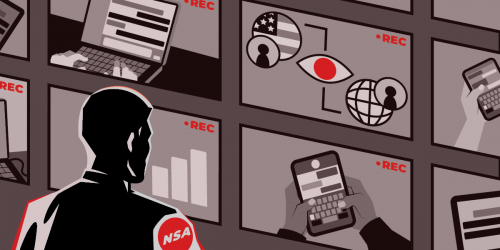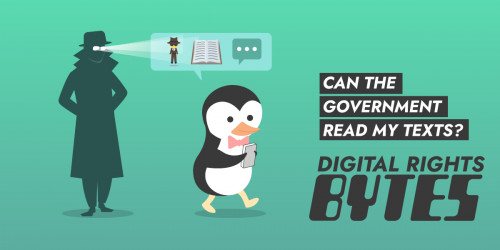Three years ago today, the world got powerful confirmation that the NSA was spying on the digital lives of hundreds of millions of innocent people. It started with a secret order written by the FISA court authorizing the mass surveillance of Verizon Business telephone records—an order that members of Congress quickly confirmed was similar to orders that had been issued every 3 months for years. Over the next year, we saw a steady drumbeat of damning evidence, creating a detailed, horrifying picture of an intelligence agency unrestrained by Congress and shielded from public oversight by a broken classification system.
The leaks were thanks in large part to whistleblower Edward Snowden, who has been living in Russia for the last three years, unable to return to the United States for fear of spending his life behind bars. Faced with charges under the Espionage Act, Snowden would be charged as if he were an agent of a foreign power who had given secrets to enemies of the United States, rather than as a whistleblower who worked with a team of reputable, award-winning journalists to bring public attention to a corrupt surveillance system. But Snowden’s motivations—and the impact of the leaks—were clearly to benefit the public. He has talked about his strong interest in restoring privacy to the Internet, stating “I remember what the Internet was like before it was being watched, and there's never been anything in the history of man that's like it.”
The Snowden leaks caused a sea change in the policy landscape related to surveillance. EFF worked with dozens of coalition partners across the political spectrum to pass the USA Freedom Act, the first piece of legislation to rein in NSA spying in over thirty years—a bill that would have been unthinkable without the Snowden leaks. They also set the stage for a major showdown in Congress over Section 702 of the FISA Amendments Act, the controversial section of law set to expire in 2017 that the government claims authorizes much of the NSA’s Internet surveillance.
The Snowden leaks were fundamental to EFF’s impact litigation strategy. Our legal team has launched three cases directly challenging the legal and constitutional grounds of NSA mass surveillance—First Unitarian v. NSA, Jewel v NSA, and our flagship case Hepting v AT&T. We are also engaged in FOIA litigation to uncover more about NSA spying and we serve as amicus in several key cases challenging NSA surveillance in the United States. The Snowden leaks and statements made by public officials responding to the leaks corroborated and provided vital details about NSA surveillance practices, which we’re using in our court cases.
Perhaps most importantly, the Snowden leaks published over the last three years have helped to realign a broken relationship between the intelligence community and the public. Whistleblowers often serve as a last-resort failsafe when there are no other methods of bringing accountability to secretive processes. The Snowden leaks have helped illuminate how the NSA was operating outside the law with near impunity, and this in turn drove an international conversation about the dangers of near-omniscient surveillance of our digital communications.
That conversation isn’t finished, and won’t be until the NSA surveillance wiretaps of the Internet are unplugged for good. But today, we’re thankful to the many brave whistleblowers who have made this public discussion possible, the investigative journalists who have worked doggedly to unpack these complex issues, the many advocacy organizations, technologists, and lawyers working with us to challenge these practices, and the countless EFF members and supporters who fight along side us.
Check out our roundup of 65 things we know thanks to the Snowden leaks, our timeline of NSA domestic surveillance (dating back to well before Snowden!), our game plan for ending mass surveillance, and our guide to defending yourself against surveillance. Also, please join EFF as a member to support our work to fight surveillance.





